Have you ever thought that maybe there’s a cure to cancer, but for whatever reason, it’s not accessible to you? For some people, this is exactly the case. While this sounds like a crazy, out-there conspiracy theory, the truth is that it may not be too far off from reality.
Of course, there’s no definite, perfect “cure” for cancer. There are treatment options, but not much beyond that. But even for those treatment options -- when there is a clear and available treatment regimen for cancer -- at times, the cost is too high for the patient to be able to afford.
What happens in cases like that? In this article, we’ll take a deeper look at the revolutionary cancer treatment options out there and discuss what gets in the way of anyone and everyone with cancer getting the help they need.
Maybe there’s a cure for your cancer and you just can’t afford it
You don’t have to look far to find families who have faced a cancer diagnosis and no way to pay for it. The situation is painfully common, even as science advances and we begin to understand more and more about courses of treatment and make them more widespread.
According to one Reddit user, “My grandmother just got diagnosed with Stage 4 cancer, and she has already been in and out of the hospital several times. She was also diagnosed with a blood clot, and as a result my mom is now injecting her twice daily with a very expensive drug...which costs I think $2000-3000 just for the first 2-week supply. My parents had enough to pay for it in full, but I don’t think they will be able to continue to afford these in the weeks/months to come.”
Unfortunately, this person’s story is not unique. Though there are treatment regimens for cancer out there, in many cases, they are cost prohibitive to the people who need them most. This creates an unfair and entirely preventable dilemma: while there are drugs that may cure or heal a person of cancer, if they are unable to afford them, it doesn’t do them any good.
A recent report by the World Health Organization (WHO) stated that expensive drugs are what impair access to the cure for cancer. In fact, “the standard treatment for breast cancer can drain 10 years of average annual income in India.” And even if someone can or does afford the cancer treatment somehow, the experience can leave them in financial ruin, which makes the rest of their life all the more challenging. In addition, “‘Pharmaceutical companies set prices according to their commercial goals, with a focus on extracting the maximum amount that a buyer is willing to pay for a medicine’... The pricing set by such intent often makes cancer medicines unaffordable, preventing the full benefit of the medicines from being realised.”
Because people will pay whatever it requires to get their cancer treatment completed and be cured of their disease, pharmaceutical companies can take advantage of this fact and price the drugs at exorbitant rates. And they do take advantage. According to the same report, “An examination of 99 cancer drugs shows that for every dollar spent in R&D, pharma companies earn a revenue that is 14.5 times the initial cost.” While this lines the pockets of drug makers, it typically means total financial devastation for patients, if they manage to shell out enough for the treatment at all. This is especially true when you consider the difference between rich and poor countries, where a price that is hard to manage for someone is completely out of reach for others.
However, sometimes positive things happen and governments bring drugs under price control. A recent article in The Print shares, "A day before the likely announcement of the poll dates, the government has released the list of 390 anti-cancer drugs where the maximum retail price has been slashed by up to 87 per cent. The revised prices have come into effect immediately."
Is CAR-T therapy a revolutionary new cancer drug?
While it seems that revolutionary cancer drugs seem to make headlines and then fall by the wayside every few months or years, occasionally something comes along that really does have the power to change the lives of cancer patients.
One such cancer treatment is called CAR-T therapy. This cancer-killing treatment is approved in Australia for human use and “trains immune cells to fight and kill cancer cells by first extracting them from a patient’s body to genetically re-engineer them before infusing them back into the body,” according to a news article on En.People.CN. The drug “supercharges immune cells to hunt and kill cancer cells” and can be used for both pediatric and young adult patients with B-cell precursor acute lymphoblastic leukemia as well as adults who have diffuse large B cell lymphoma. One patient who received CAR-T therapy had his cancer vanish within a month of receiving the treatment.
Unfortunately, the same situation described above persists: “Patients who undergo the treatment in Australia face an out-of-pocket cost of up to 598,000 Australian dollars.” While CAR-T therapy may just be the miraculous cure-all for someone with cancer, if they don’t have half a million Australian dollars to be able to pay for it, then there’s no hope for them. Just because someone has cancer and wants to be healed using a treatment method that is out there and available for human use doesn’t mean they’ll be able to access it, and that’s a hard truth for the human race to face.
In addition to cost issues, sometimes a drug is not available in a certain country or to a certain people. For example, some people turn to importing drugs from other countries or even traveling to seek the treatment regimens they need. It is not uncommon to hear of situations like a friend purchasing a liver cancer drug from India called Sorafenib (Nexavar) in order to treat themselves of their cancer, or even breaking the law in order to access illegal cancer drugs, as in the Chinese movie Dying to Survive.
Other revolutionary cancer treatments
NBC News published an article about a new cancer drug called Vitrakvi. It’s approved by the FDA and targets genetic mutation in that it is “designed and approved to treat cancers that arise anywhere in the body that carry a certain genetic characteristic” -- in other words, the drug can target cells based on genes. “While several drugs are approved to treat a variety of different cancers based on genetic mutations, Vitrakvi, known generically as larotrectinib, is the first that is approved from the beginning to treat cancers solely based on the mutation.”
Dr. David Hyman, chief of early drug development at Memorial Sloan Kettering Cancer Center in New York, describes it this way: “Traditionally in cancer therapy, we’ve treated patients based on where their cancer came from, what part of the body. What makes Vitrakvi unique is that it works regardless of where the cancer came from as long as it has the specific mutation.” This is a major development in the world of cancer treatments. If cancer cells can be targeted and treated at the gene level, then there’s a greater probability of curing more and more people.
Unfortunately, according to Bayer, the new drug will cost $393,000 a year -- and that’s at wholesale prices. The medication for children -- a pediatric syrup -- isn’t any better: it’s $11,000 a month for a child to pursue this course of treatment. With prices as prohibitive as these, it’s not likely that many people are able to afford or acquire treatment or heal from their disease. Even governments cannot afford the treatments and are not able to provide them at a subsidized level.
Upon releasing this information, the WHO also recommended ways to widen access to these cancer treatments. Potential methods include increasing transparency regarding discounts and the R&D costs associated researching and creating the drugs. They also suggested setting different prices for different countries and placing short-term price caps on drugs during necessary times.
Ways to reduce your risk of cancer
Can you avoid cancer? Maybe not -- if that was possible, everyone would do it. But can you take steps to reduce your risk of cancer? Certainly. It is well established that there are certain activities and behaviors that increase your risk of cancer or even cause cancer directly.
For example, sunburns (caused by overexposure to sun) as well as cigarette smoking are both linked to developing cancer. Do these and you increase your chances of developing cancer significantly. Avoid these and you improve your odds. Exercising regularly, wearing sunscreen, and getting regular screening tests are also important in the fight against cancer. What other proactive steps can you take to reduce your risk of cancer? Fortunately, it is possible to take matters into your own hands, at least to some degree.
A recent article published in the South China Morning Post shared the results of a French study that found some promising conclusions: “Research on nearly 70,000 French adults found that those who ate the most organic food were less likely to develop certain forms of cancer than those who ate the least.” In other words, a diet rich in organic foods may help to reduce your risk of cancer. Opting for organic alternatives to your usual diet may help lower your risk of developing certain types of cancers.
So, does organic food automatically secure you a spot in the cancer-free zone? Not necessarily. At the end of the day, nothing can promise that. “Because of the way the study was conducted, it is impossible to say that the organic foods people ate were the reason why they had fewer cases of cancer. But the results are significant enough to warrant follow-up studies.” Regardless, the correlation between organic foods and a lessened cancer risk is high enough that it’s worth considering and incorporating into your normal eating regimen. Though scientists are not sure exactly the reason why or how organic foods lead to a lower cancer rate, the results remain telling, and people should take note.
How to find legitimate sources for buying prescription medications online
Looking for affordable cancer drugs or other prescription medications? You’re in the right place. We can help you find legitimate sources for buying prescription medications online.
One interesting situation that occurred on the Internet recently raises an important point about fraudulent websites and the dangers uninformed consumers face. In an article published by the American Enterprise Institute (AEI), Roger Bate shares one of the barriers to online drug safety. “To warn consumers of the dangers of importing medicine, the search engine Bing has placed pop-up warnings against foreign websites selling medicines. Unfortunately, the sites targeted are credentialed foreign pharmacies, while potentially rogue sites are in effect given a clean bill of health by having no pop-up warnings. … To add insult to possible injury, the uncredentialed sites were on average 25 percent more expensive. Bing must change its policy, since the current one is driving traffic to unsafe sites and away from legitimate international pharmacies.”
If people are using search engines to find good places to order prescription medications online yet are being led astray by a company they trust, how are they to really know what they’re ordering? This is why it’s important for people to do adequate research before they order or buy prescription medications online.
One well respected organization called Campaign for Personal Prescription Importation is worth looking into. They recently released their annual survey, which found that “cost is the primary reason that Americans order medications from online pharmacies in Canada as they feel it is a reasonable option for accessing life-saving and life-enhancing prescription drugs. More than half of respondents (52 percent) report saving up to $199 each month by ordering through an online pharmacy. Among people who save more than $300 per month (38 percent of respondents), the average savings that they report is $910.” Those numbers are amazing! It’s clear that ordering from an online Canadian pharmacy is the way to go if you want to secure your prescriptions for less.
The website also provides tips and guides to consumers, showing them how they can find and frequent online Canadian pharmacies they can trust. One of their recommendations is to only order from online Canadian pharmacies that are approved by the Canadian International Pharmacy Association.
Luckily, we fall under both categories! We invite you to look further into who we are and what we do. We are proud to be able to provide high-quality prescription medications at price points that our customers can actually afford. Making prescription drugs accessible to the people who need them is what we’re all about.
Top 7 cancer drugs available from Canadian Pharmacy World
Looking for the top cancer drugs you can order online? Learn more about the most popular cancer drugs we are selling and have available to you on our website below. We’ve included a breakdown of the top 7 cancer drugs that we sell so you can know all about the dosages, monthly average cost, and then compare it to our much lower cost.
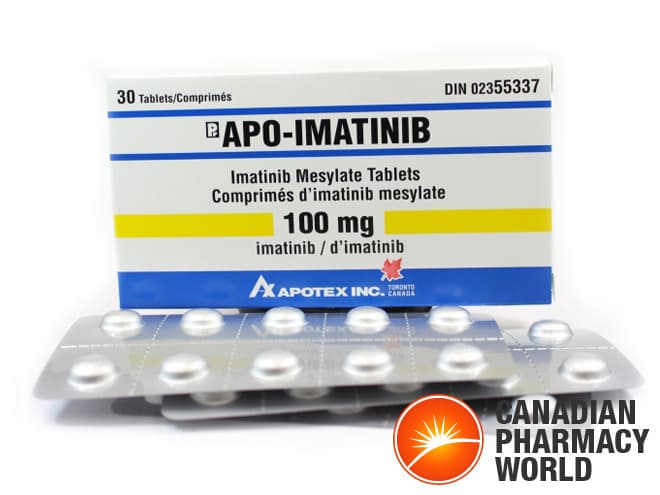
Photo Credit: Apo-Imatinib 100 mg from Apotex by @CANPharmaWorld
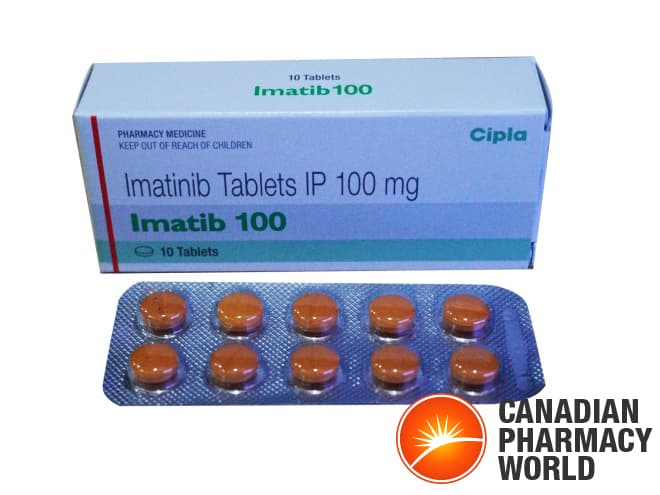
Photo Credit: Imatib Imatinib 100 mg from Cipla by @CANPharmaWorld
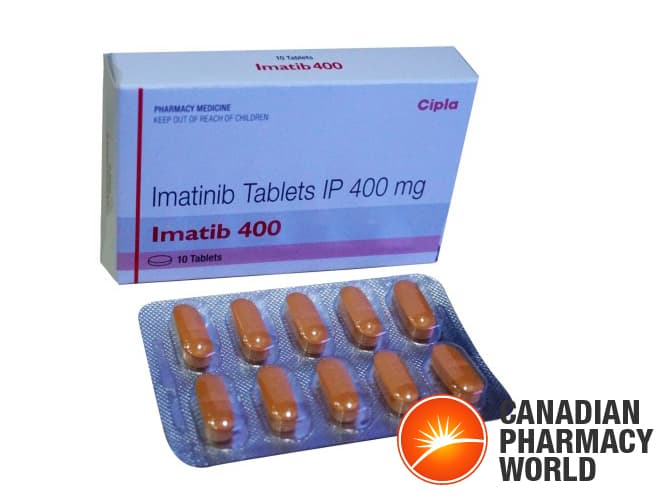
Photo Credit: Imatib Imatinib 400 mg from Cipla by @CANPharmaWorld
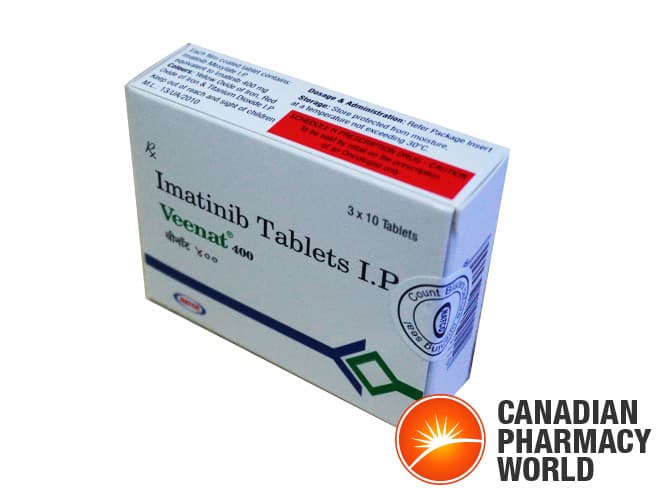
Photo Credit: Veenat Imatinib 400 mg from Natco by @CANPharmacyWorld
Brand Manufacturer: Novartis from Turkey (also known as Glivec)
Generic Equivalents Availability: Yes. From Canada (also known as Apo-Imatinib by Apotex) and India (also known as Imatib by Cipla or Veenat by Natco)
Dosage Forms: 100 mg, 400 mg tablets
Condition or disease treated: leukemia, certain tumors of the stomach and digestive system
Global sales: 4.7 billion
Monthly average retail cost: $2935.7 per month ($97.9 per pill)
CPW cost: $59.7 per month ($1.99 per pill) for a generic version from India, $415 per month ($13.83 per
pill) for a generic version from Canada
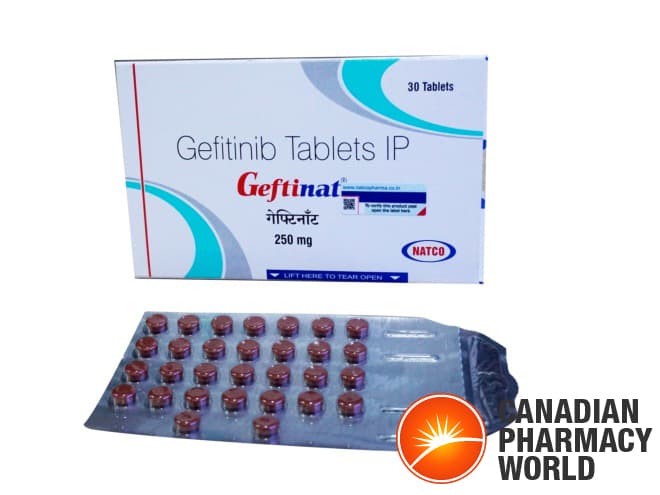
Photo Creidit: Geftinat Gefitini 250 mg from Natco by @CANPharmaWorld
2. Iressa (Gefitinib)
Brand Manufacturer: Not Available
Generic Equivalents Availability: Yes. From Canada and India (also known as Geftinat by Natco Pharma)
Dosage Forms: 250 mg tablets
Condition or disease treated: lung cancer
Global sales: 500 million
Monthly average retail cost: $8,060 per month ($268.7 per pill)
CPW cost: $330 per month ($11.1 per pill) for a generic version from India, $1,849 per month ($61.63
per pill) for a generic version from Canada
3. Tarceva (Erlotinib)
Brand Manufacturer: Hoffman - La Roche from Canada
Generic Equivalents Availability: Yes. From Canada and India (also known as Erlonat by Natco Pharma)
Dosage Forms: 25 mg, 100 mg, 150 mg tablets
Condition or disease treated: lung cancer
Global sales: 1.42 billon
Monthly average retail cost: $2,849 per month ($95 per pill)
CPW cost: $509 per month ($16.97 per pill) for a generic version from Canada, $923 per month ($32.3
per pill) for a generic version from India
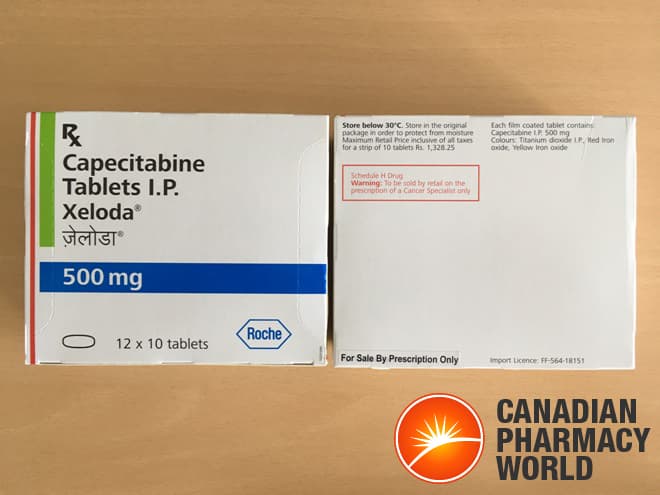
Photo Creidit: Xeloda 500 mg from Roche by @CANPharmaWorld
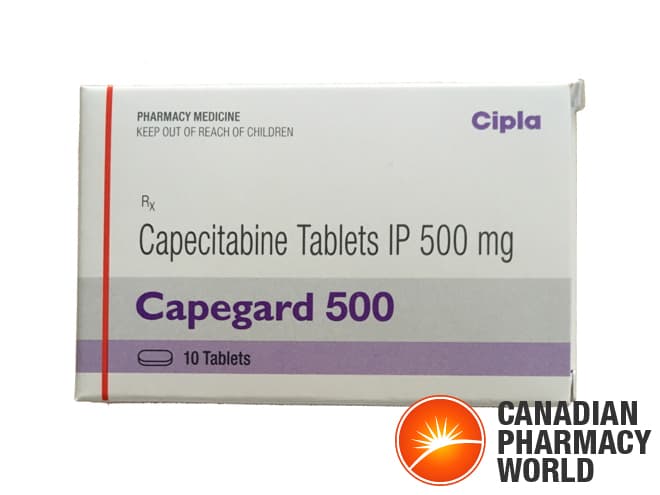
Photo Creidit: Capegard Capecitabine 500 mg from Cipla by @CANPharmaWorld
4. Xeloda (Capecitabine)
Brand Manufacturer: Hoffman - La Roche from Canada
Generic Equivalents Availability: Yes. From Canada and India (also known as Capegard by Cipla)
Dosage Forms: 150 mg, 500 mg tablets
Condition or disease treated: breast, colon, or rectal cancer
Global sales: 7.8 billon
Monthly average retail cost: $429 per month ($14.3 per pill)
CPW cost: $51.6 per month ($1.72 per pill) for a generic version from Canada, $97.8 per month ($3.24
per pill) for a generic version from India
5. Xtandi (Enzalutamide Acetate)
Brand Manufacturer: Astellas Pharma from Canada
Generic Equivalents Availability: Not Available
Dosage Forms: 40 mg capsules
Condition or disease treated: prostate cancer
Global sales: 2.5 billon
Monthly average retail cost: $7,450 per month ($248.3 per pill)
CPW cost: $1,094 per month ($36.49 per pill) for brand version from Canada
6. Zytiga (Abiraterone Acetate)
Brand Manufacturer: Janssen-Ortho from Canada
Generic Equivalents Availability: From India, also known as Xibra by Cipla
Dosage Forms: 250 mg, 500 mg tablets
Condition or disease treated: prostate cancer
Global sales: 2.4 billon
Monthly average retail cost: $5,000 per month ($166 per pill)
CPW cost: $240 per month ($7.99 per pill) for the generic version from India
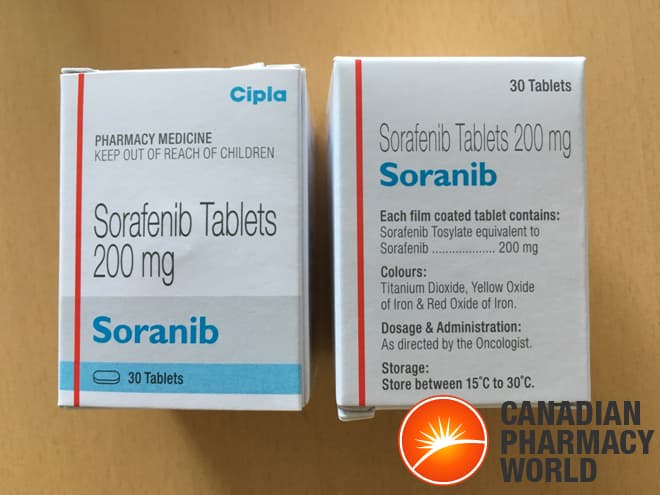
Photo Credit: Soranib Sorafenib 200 mg from Cipla by @CANPharmaWorld
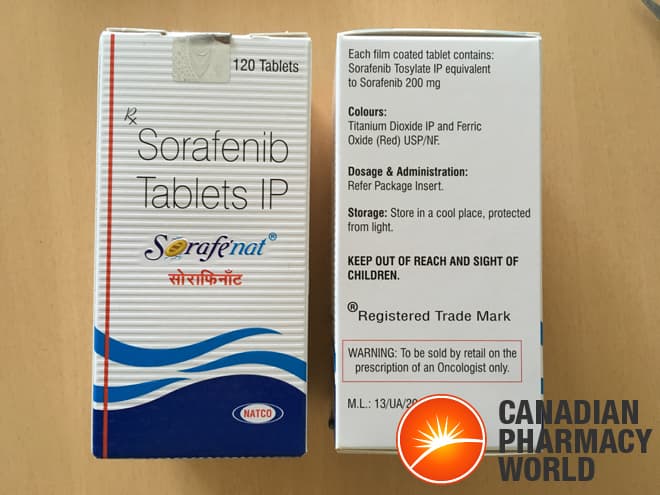
Photo Creidit: Sorafena Sorafenib 200 mg from Natco by @CANPharmaWorld
7. Nexavar (Sorafenib)
Brand Manufacturer: Not Available
Generic Equivalents Availability: From India, also known as Soranib manufactured by Cipla, and Sorafenat manufactured by Natco Phama
Dosage Forms: 200 mg tablets
Condition or disease treated: kidney, liver and thyroid cancers
Global sales: 2.4 billon
Monthly average retail cost: $8,000 per month ($266.7 per pill)
CPW cost: $111.7 per month ($3.72 per pill) for the generic version by Cipla, $88.8 per month ($2.96 per
pill) for the generic version by Natco Pharma
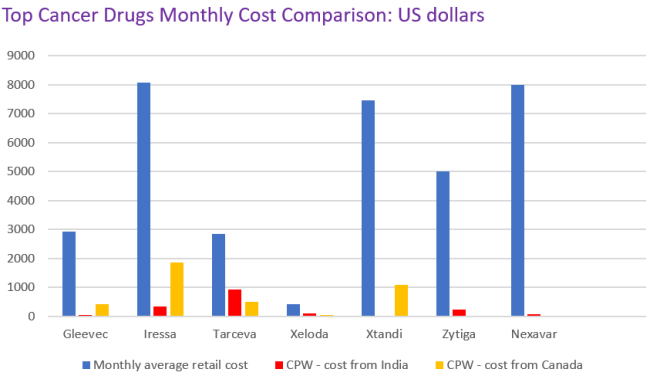
Photo Credit: by @CANPharmaWorld
Disclaimer: You should always follow your doctor’s advice and prescription medication regimen, and order using a valid prescription only. We may supply different brand names and generic equivalent from global countries. Call our toll free for product details.
###
Skye Sherman is a professional writer who has been published in numerous local and international outlets. She has also worked for a wellness company and is very familiar with the healthcare industry. She holds a degree from a Florida university.
Your email address will not be published. Required fields are marked with *.